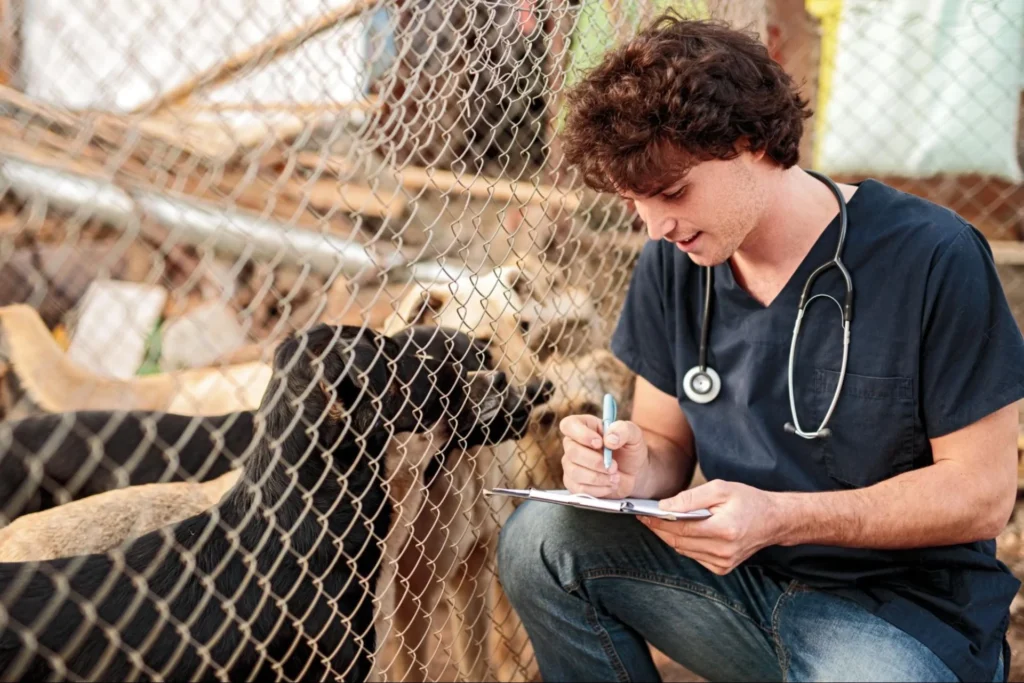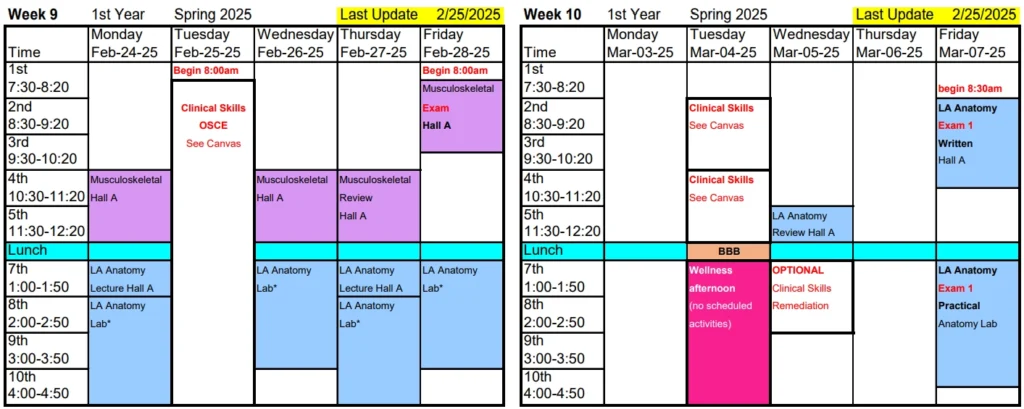About the Writer
What Is Vet School Like? [Answers to Common Vet School Questions]
So, you want to be a vet?
Maybe you imagine long days filled with puppies and problem-solving or late nights studying complex medical cases. The truth? Vet school is a unique journey that will stretch you, shape you, and introduce you to challenges you never saw coming.
But what is vet school really like? Is it as hard as people say? What does a typical day look like? And how are students graded?
Let’s dive into all of that and more with a closer look at what to expect during your time as a vet student in the US.

Cutting to the Chase – What is Vet School Like?
Before we begin answering your burning questions, let’s get to the heart of it.
Put simply, vet school is hard, rewarding, and will be unlike anything you’ve done before.
Expect long hours, a heavy workload, and lots of pressure, but also plenty of opportunities for personal growth.
Vet school also can be emotionally taxing, especially when balancing academics, clinical work, and personal time.
However, completing the program will leave you well-prepared for a career in the veterinary field.
How Do I Get Into Vet School?
Getting into vet school starts with an application. We have a comprehensive application checklist for you to use, but the basic steps are:
- Researching vet school options: First, you’ll need to decide which schools to apply to. This will be one of the most important decisions you make, so do plenty of research. With our VetMed Match tool, you can see different institutions and programs that align with your interests, grades, and preferences.
- Completing the VMCAS application: Most vet schools will require you to complete a Veterinary Medical College Application Service (VMCAS) application, which includes creating a profile, mailing your transcripts, and paying any fees.
- Taking the GRE: Next, you should study for and take the GRE, which is a standardized, multiple-choice exam that assesses various skills.
- Writing a personal statement: Along with your application, you’ll need to write a personal statement that explains your decision to pursue the field and demonstrates why you’re a good fit for the school you’re applying to.
- Getting letters of recommendation: You’ll need to request recommendation letters from individuals who can speak to your work ethic and personality, such as your past professors.
- Preparing for interviews: Finally, you must prepare for vet school interview questions to successfully complete your interview.
Completing these steps will help land you a spot in your preferred vet school. Soon after, you’ll arrive on campus for your first day as a veterinary student.
What’s a Typical Day in Vet School? (A Day in the Life of a Vet Student)
On a typical day at vet school, a first-year student might start with a lab session at around 9:00 a.m., but sometimes as early as 7:30 a.m., followed by a couple of lectures.
After a one-hour lunch break, there are usually two more two-hour classes in the afternoon, with the day wrapping up around 5 or 6 p.m.
When classes are finished, many students take a break and then study for a few hours, anywhere from 2 to 4 hours in the evening.
While some schools focus heavily on lectures, many offer recorded lectures that allow students to watch at their own pace, making it easier to manage schedules.
Each year, you can expect the workload to increase and become more focused on clinical work and hands-on experience.
For more specific details, consider checking out forums for your shortlisted schools. Just type “[your school] student forum” into Google to find firsthand accounts from current or past students.

How Hard Is Vet School?
Yes, vet school is hard, there’s no way around it. You can expect a mix of long hours, intense coursework, and high expectations.
You’ll need to absorb huge amounts of information, as your courses will cover everything from anatomy and pharmacology to epidemiology and pathology.
Your clinical years will push you even further. You’ll work long shifts, be expected to think quickly, handle emergencies, and work alongside seasoned veterinarians who will need you to keep up.
There will be moments when you barely get to do more than observe, and others when you’re thrown into the deep end. It’s intense, but it’s also where you really start to feel like a vet.
But, despite this, most students still manage to get through and graduate.
The admissions process is also notoriously difficult, so if you’re accepted into a vet school, you’re likely already well prepared for the challenge.
What Are the Most Common Challenges in Vet School?
While the toughest part of vet school will vary between students, here are some of the most common challenges you’ll face:
- Academic pressure: You’ll be learning alongside skilled and driven classmates. It’s common for students to compare themselves to others, and feel a lot of pressure to keep up good grades and continue to perform well.
- Emotional toll: Vet school can be isolating at times, especially if you’re far from home or struggling to maintain a work-life balance. When you’re not in classes, you’ll be spending a lot of time in the library, labs or on farms and hospitals gaining hands-on experience. You’ll need to make a consistent effort to find enough time for yourself in these years.
- Financial stain: The cost of veterinary school can be very high. While you’ll likely have a loan or another form of financial aid, you may still need to budget carefully to cover tuition, supplies, and living expenses
These challenges aren’t unique to vet school; they’re a common part of the academic journey. The key is learning how to navigate them without losing sight of why you started.
But that doesn’t mean it’s stress and struggle. If you’re passionate about becoming a vet, you will make it.
It won’t be easy, but it will be worth it. And when you finally walk across that stage, DVM in hand, you’ll know you earned every bit of it.
How Can You Prepare Before Vet School?
The good news is that you can ease the pressure of vet school by preparing beforehand.
How to Prepare for Vet School as a College Undergraduate
Once you’re in college, the path to vet school becomes more structured. Here’s how you can make the most of your undergraduate years:
- Choose the right coursework: Pursuing a pre-vet track or a major in biology, animal science, or a similar field will help you complete the necessary math and science classes.
- Maintain a competitive GPA: Admissions are extremely competitive, so keep your grades up and take any extra opportunities that can help you get into vet school.
- Gain hands-on experience: Shadow veterinarians, work as a vet assistant, or volunteer at animal shelters to get used to working with animals.
- Develop good study habits: You’ll need to put in a lot of effort during vet school, and figuring out the study techniques that work best for your learning style will make a big difference when it comes to retaining information.
Other Ways to Prepare
Here are some other things we recommend doing before you go to vet school:
- Find a hobby you enjoy: It’’s easy to get overwhelmed by the stress and pressure of school. Having a hobby like art, music, hiking, or anything else gives you a way to unwind during your downtime, keeping you more happy and relaxed.
- Develop practical life skills: At vet school, you’ll have much more independence, and you may find yourself out of your depth. Learning how to meal prep, budget your expenses, and set up a comfortable living space will make your transition to vet school smoother.
- Make the most of your free time: Don’t get too hung up on preparing for veterinary school. You’ll have plenty of time to figure things out and even more time dedicated to studying. Spend time with family and friends, travel, relax, and soak in the moments before the hard work begins.

How Long is Vet School?
Vet school typically takes four years to complete (or eight semesters).
Your time at school will usually be divided into two main phases: the pre-clinical phase and the clinical phase.
Pre-Clinical Phase (Years 1-2)
In the first two years of vet school, students focus on foundational science courses, including subjects like anatomy, physiology, biochemistry, pharmacology, pathology, and microbiology.
During this phase, students build the knowledge necessary to understand how animals’ bodies work, how diseases affect them, and the basics of treatment. It’s mostly classroom-based with some laboratory work.
Clinical Phase (Years 3-4)
In the final two years, students shift to more hands-on learning in clinical settings. They work directly with animals in a veterinary hospital or clinic, diagnosing and treating various cases under the supervision of experienced veterinarians.
This phase often involves rotations through different specialties, such as surgery, internal medicine, dermatology, and emergency care.
But just as important as working with animals is learning how to work with their humans. The clinical phase gives students a first real taste of client interaction by explaining diagnoses, discussing treatment plans, and managing expectations. Observing experienced vets handle difficult conversations, emotional clients, or sensitive topics is a crucial part of the learning process. Mastering this kind of communication is one of the less obvious, but most essential, skills a future vet needs.
After completing the program, you’ll graduate with a Doctor of Veterinary Medicine (DVM) degree.
How Are Vet School Students Graded?
Veterinary school students are typically graded based on a combination of exams, lab work, assignments, and class participation. Grading systems can vary by school, but many use letter grades.
For example, At Cornell University College of Veterinary Medicine, students are graded based on their performance in each course. The final grade is made up of several components determined by the course leader. A 93 – 95 is an A, 83 – 85 B, and so on.
So, while students receive letter grades, those grades are often converted into GPA points to reflect their academic performance on a 4.0 scale.
A 3.5+ GPA is considered competitive, but it’s not the only factor that determines whether you’ll get accepted into internships or residencies.
If you excel in clinical experience or relevant extracurricular activities, even with a lower GPA, you may still stand out as a strong candidate.
Final Thoughts: Is Vet School Right for You?
Our final question is one that only you can answer.
If you’re passionate about working in the veterinary field, vet school is the obvious next step.
Sure, the academic challenges, stress, and heavy workloads can be off-putting, but they’re there to help better your skills and provide the knowledge you need to thrive in the stages after graduation.
The good news is that you don’t have to go through these struggles and decisions alone.
If you’re struggling as a student, book a call with one of our experienced vet consultants for guidance.
